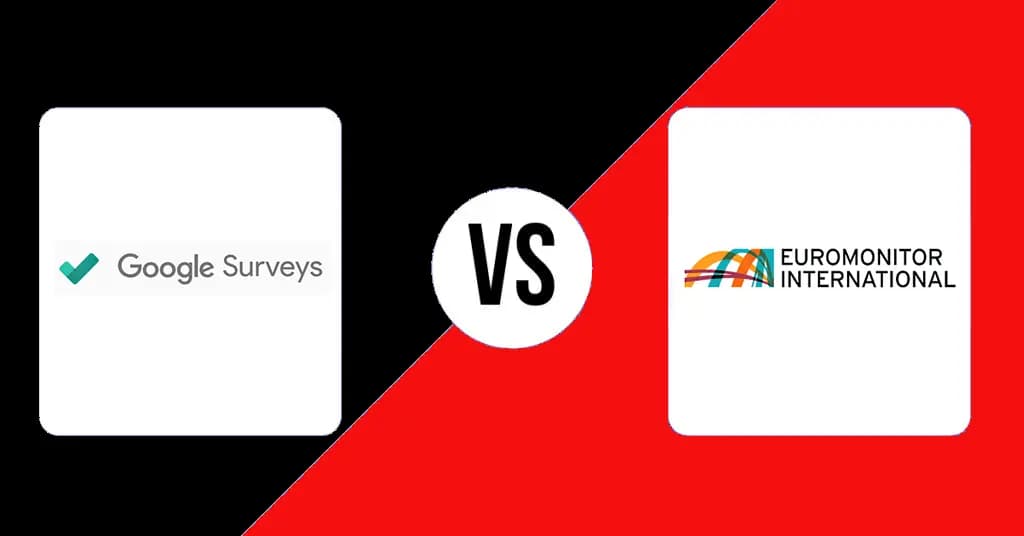Comparing Google Surveys and Euromonitor: A Comprehensive Evaluation for Consumer Research


Tunica Tech
4 min readApril 30
Comparing Google Surveys and Euromonitor: Which Market Research Tool Should You Use?
Market research is a crucial aspect of any business strategy, as it helps companies understand consumer behavior, preferences, and trends in their respective industries. For many years, traditional methods of market research such as surveys, focus groups, and interviews were the primary means of gathering data. However, with the rise of technology, new tools and platforms have emerged, providing businesses with more efficient and cost-effective ways to conduct market research.
Two popular tools used for market research are Google Surveys and Euromonitor. Both use different methods to gather data and offer unique features to businesses. In this article, we will compare Google Surveys and Euromonitor in terms of their features, data accuracy, pricing, and other factors to determine which is the better option for businesses.
What is Google Surveys?
Google Surveys is a market research platform that allows businesses to conduct custom surveys and collect data from a specific target audience. It was launched in 2012 and has gained popularity due to its easy-to-use interface and affordable pricing options.
What is Euromonitor?
Euromonitor is a market research company that provides data and insights on industries, countries, and consumers worldwide. It was founded in 1972 and offers a range of products and services such as reports, dashboards, and databases to help businesses make informed decisions.
Features
Both Google Surveys and Euromonitor offer a wide range of features for businesses. Google Surveys allows users to create custom surveys with various question types such as multiple-choice, open-ended, and ranking questions. It also offers targeting options to reach a specific audience based on demographics, geography, and interests.
On the other hand, Euromonitor provides users with access to a vast amount of data and insights on industries, companies, and consumers worldwide. It offers a dashboard feature that allows businesses to track the performance of specific industries, as well as a forecasting tool for market projections.
Data Accuracy
Data accuracy is a crucial aspect of market research as it ensures that the insights and conclusions drawn from the data are reliable. Google Surveys uses a sampling method called "river sampling," which collects responses from a wide range of online publishers and respondents to ensure a diverse set of data. However, since it relies on online responses, it may not be entirely representative of the overall population.
Euromonitor, on the other hand, uses a combination of primary and secondary research methods to gather data, making its insights more accurate and reliable. It also has a team of analysts who validate and audit the data to ensure its accuracy.
Pricing
Pricing is another crucial factor in determining which market research tool is the better option for businesses. Google Surveys has a pay-per-response model, where businesses pay a specific amount for each completed survey response. The cost per response can range from $0.10 to $3.00, depending on the target audience and the length of the survey.
Euromonitor offers customized pricing based on the specific needs and requirements of a business. While this may make it more expensive than Google Surveys, it offers more comprehensive and in-depth data and insights.
Ease of Use
Both Google Surveys and Euromonitor have user-friendly interfaces that make it easy for businesses to create and analyze their surveys and data. However, Google Surveys has a more straightforward and intuitive user interface, making it easier for businesses with limited technical knowledge to use the platform.
Integration
Integration with other tools and platforms is crucial for businesses, as it allows them to streamline their processes and save time and resources. Google Surveys integrates seamlessly with Google Analytics and Google Data Studio, making it easier to analyze and visualize the data collected.
Euromonitor also offers integration with other tools such as Tableau, Microsoft Excel, and Power BI, allowing businesses to combine their data from other sources and compare it with Euromonitor's insights.
Support
Support is another factor to consider when choosing a market research tool, as businesses may need assistance in setting up and using the platform. Google Surveys has a comprehensive help center, which includes tutorials, FAQ, and troubleshooting guides. It also has a customer support team available via email for any additional assistance.
Euromonitor also has a help center and a dedicated client service team to assist businesses with their data and product inquiries.
Conclusion
Both Google Surveys and Euromonitor offer unique features and benefits for businesses. Google Surveys is more affordable and easier to use, making it an ideal option for small businesses and startups. On the other hand, Euromonitor provides more accurate and comprehensive data and insights, making it a better choice for larger companies with specific research needs.
Ultimately, the decision on which market research tool to use will depend on the specific needs and priorities of your business. It is recommended to evaluate both options thoroughly and choose the one that best meets your requirements and budget.
Need Help With Google Surveys?
Setup a Quick Call now.
How to Use
Similar types of Tools
- Quick Links
- Homepage
- Projects
- About Us
- What we do
- Careers
- Services
- Product Dev
- MarTech
- Data Analytics
- Our Products
- TrakNeo
- pURL
- Breathe India
- Arivu
- LIFI